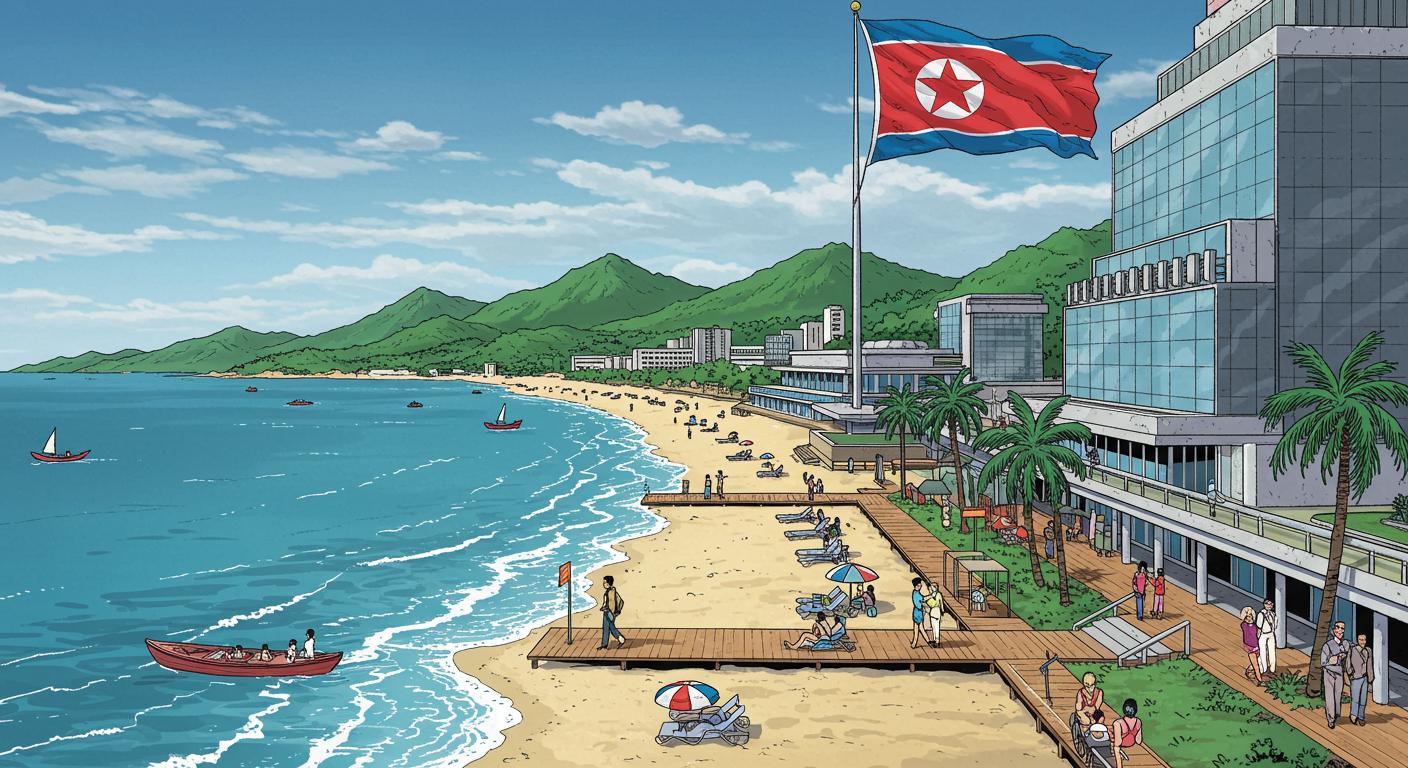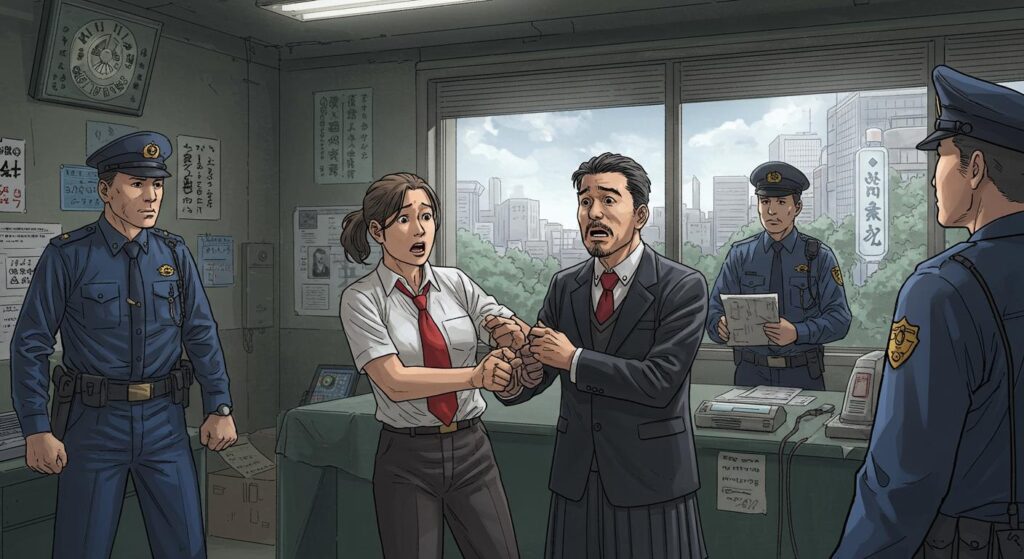There are few phrases that conjure immediate dissonance quite like “North Korean beach resort.” Yet, as detailed by BBC News and also reported by JOE, that’s precisely the image emerging on the hermit kingdom’s east coast, with the Wonsan Kalma Coastal Tourist Zone poised for a July debut. Six years overdue, presided over by Kim Jong Un himself (flanked by family and select Russian dignitaries, in what I imagine was not your standard ribbon-cutting), this new stretch of engineered leisure aspires to be equal parts domestic morale booster, political theater, and economic experiment.
Sandcastles in a Sanctioned Land
The idea, at least per official lines as relayed by BBC News, is tantalizingly straightforward: attract tourists to a sun-soaked four-kilometer beachfront equipped—on paper—with hotels, shopping malls, restaurants, and even a water park. KCNA, North Korea’s state media, claims the resort can accommodate up to 20,000 visitors at capacity, but BBC News notes none of these amenities have been independently verified. This is North Korea, after all—a place where transparency is not exactly the main export.
One can almost hear the paint drying on grandiose plans: glittering photos of empty hotels, aerial shots of broad boulevards ghosting toward the sea. North Korea has long invested disproportionate resources into military parades and shimmering Pyongyang monuments celebrating its ruling family. But this is a new flavor—resort kitsch cross-bred with autarkic posturing.
There’s a certain irony here: Wonsan was once more famous as a missile testing site than a leisure destination. Kim Jong Un spent childhood years ensconced here among beachside elite villas, per JOE, and now the town is being recast as the country’s vacation playground. History, written not just by the victors—but by those who own the keys to the luxury cabana.
Tourism or Performance?
So, will the world’s most isolated country become the next Phuket or Cancun? Not quite. The rub is, for now, almost all the sand will be trod by domestic feet. According to BBC News, while North Korea technically reopened to Western tourism in February—welcoming in select British, French, German, and Australian travelers with little fanfare—the doors were abruptly shut again weeks later, without explanation.
The only feasible international visitors at present are Russians, whose access lines up suspiciously well with the recent reopening of direct train service between Moscow and Pyongyang and, as noted by JOE, North Korea’s willingness to send troops to aid Russia in Ukraine. It’s an exchange program of a very particular (and legally dubious) sort. Sun, sand, and sanctioned soldiers—certainly not the usual TripAdvisor blend.
The resort’s capacity for lifting North Korea’s economy out of its diplomatic and fiscal morass is, at best, a long shot. Decades of punishing sanctions have left the country perennially resource-starved, despite a state-controlled focus on grand projects. BBC News highlights that most tourist groups traditionally hail from China and Russia—countries whose idea of a luxury getaway might differ slightly from Western vacationers.
Who Wants a Beach Vacation in North Korea?
Travel industry voices are politely skeptical. Rowan Beard, representing Young Pioneer Tours, told BBC News he had hoped the new development might herald a wider opening to foreign travelers. But with only friendly (read: Russian) tourists allowed, optimism remains, let’s say, salted. Beard goes further, suggesting that the “main highlights” for international guests are still Pyongyang, the DMZ, and the country’s singular collection of brutalist and communist landmarks. The appeal of a North Korean shopping mall or resort pool, then, seems destined for a very niche clientele.
There is, however, something admittedly fascinating about the notion of a North Korean beach resort. Elliott Davies, from Uri Tours, mused—also to BBC News—on the “niche appeal” for travelers drawn to the unconventional. “It’s intriguing to experience something as familiar as a beach resort that’s been shaped within the unique cultural context of North Korea,” Davies explained. One imagines the novelty is less about sunbathing and more about the odd cognitive whiplash of sipping a (most likely non-alcoholic) mocktail on the same coastline that once bristled with missile tests.
A “Great, Auspicious Event”—Or Just a Mirage?
KCNA, as relayed by BBC News, bills Wonsan’s opening as a “great, auspicious event” and “prelude to the new era” in tourism. What exactly that era entails is murky. Taken literally, the new resort stands as both monument and mirage—intent on dazzling, but solid only if you avoid tapping too hard on the surface.
Both BBC News and JOE flag the same quirks: the lavish promises, the opaque reality, and a curiously timed spike in Russian guest access, all against an ever-present backdrop of hardship for ordinary North Koreans. There’s also the immediate context—delays dating from 2019, with construction issues predating pandemic-related slowdowns, as BBC News details. Even in North Korea, you can’t simply declare a resort open and expect reality to cooperate.
So, what to make of North Korea’s next big gamble? A real attempt at slow-motion opening? Another carefully stage-managed spectacle for internal and allied consumption? Or something more abstract—a resort as performance art, its true audience never intended to buy suntan lotion?
In a world of paradoxes, Wonsan Kalma claims its own: a beach where the only waves most of us will ever see come courtesy of satellite photos. Would you ever put North Korea on your fantasy beach destination list, out of curiosity or conviction? Or is this just a castle sculpted from the sand of wishful thinking?







